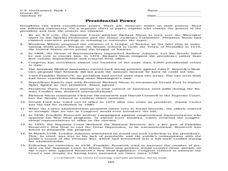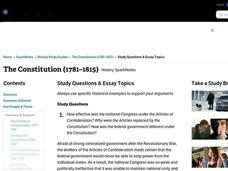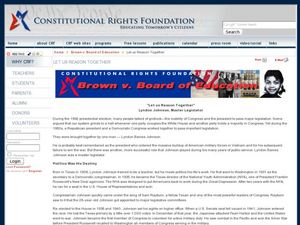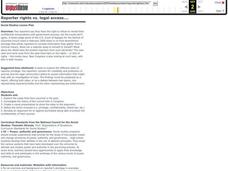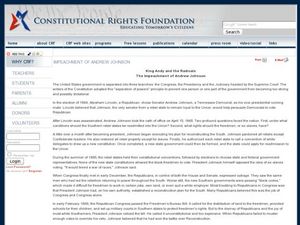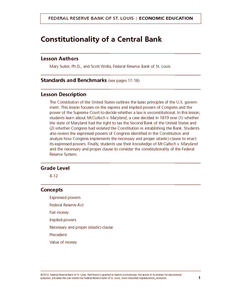Curated OER
Simplified United States Constitution and Bill of Rights
A good handout is a great find. Print this resource and hand out a simplified version of the US Constitution and Bill of Rights to your US government or US history class. The powers of the president, Congress, and the Senate are...
Curated OER
Documents and Symbols and American Freedom
Students complete a unit of lessons on the documents, symbols, and famous people involved in the founding of the U.S. government. They create a personal bill of rights, write a found poem, design a flag, conduct research, and role-play...
Curated OER
Health - Lesson Plan on Prescription Drug Prices
Students examine the issue of prescription drug prices in the United States. They discover how globalization impacts the available remedies to lower the costs to American consumers. They participate in a mock U.S. Senate Commerce Committee
Curated OER
The Three Branches of Government
Sixth graders discover details about the 3 branches of government. In this primary source analysis instructional activity, 6th graders examine documents and images from the Library of Congress to investigate the structure of the U.S....
Curated OER
Checks on Presidential Power
Students examine presidential powers. In this checks and balances lesson, students identify the constitutional and informal restraints of the president and consider the reasons for the limitations.
Curated OER
The Constitution (1781–1815)
In this online interactive history learning exercise, students respond to 8 short answer and essay questions about the U.S. Constitution. Students may check some of their answers on the interactive learning exercise.
Judicial Learning Center
The Power of Judicial Review
Marbury v. Madison is arguably the most important landmark case in the history of the Supreme Court. A fact-filled lesson provides background information about the case and two others related to the concept of judicial review. Scholars...
Curated OER
Constitution Worksheet
In this U.S. Constitution activity, learners respond to 63 short answer questions about Articles I-VII of the American plan for government.
National Endowment for the Humanities
George Washington: The Precedent President
Everyone knows that George Washington was the first president, but do your scholars know why that was so important? The lesson plan, the third in a sequence of three, allows learners to understand how George Washington set a precedent...
National Endowment for the Humanities
Lesson 4 James Madison: Internal Improvements Balancing Act—Federal/State and Executive/Legislative
Who has the power? The founding fathers asked the same question when the United States was formed. Learners explore issues that arose during Madison’s presidency that raised constitutional questions. Through discovery, discussion, and...
Curated OER
Nuclear Power Gets A Boost
Students examine nuclear plants and how they use fission reactions to generate electricity, compare fusion reactions to fission, and read about technology that may soon allow fusion to become practical for producing nuclear power...
Curated OER
"Let us Reason Together" Lyndon Johnson, Master Legislator
Students explore the contributions of Lyndon B. Johnson. For this congress lesson, students listen to their instructor lecture on the prowess of Lyndon B. Johnson's legislative skills. Students respond to discussion questions connected...
Curated OER
Reporter Rights vs. Legal Access...
High schoolers explore cases that have occurred in the past in which reporters refuse to reveal their confidential conversations with government sources and investigate the status of the current bills in Congress. Students use this...
Curated OER
Impeachment of Andrew Johnson
Students examine the impeachment proceedings of Andrew Johnson. In this U.S. Constitution lesson, students listen to their instructor present a lecture on the details of Andrew Johnson's impeachment and Reconstruction. Students...
Curated OER
US Government: The Checks and Balances System of the US Constitution
Young scholars examine the responsibilities of the 3 branches of U.S. government. In this checks and balances lesson, students identify the powers of the legislative, executive, and judicial branches of government. Young scholars share...
Curated OER
Chapter 18 – The New Deal
In this U.S. history worksheet, students read assigned textbook pages regarding New Deal policies and respond to 47 short answer questions.
Curated OER
The First Amendment: Freedom of Expression
Students explore First Amendment rights. In this U.S. Constitution lesson, students examine the freedom of expression as they view a PowerPoint presentation and listen to the lecture that accompanies it.
Curated OER
Judicial Branch & Supreme Court Questions
In this U. S. government learning exercise, students respond to 19 short answer questions about the responsibilities of Supreme Court members in the United States.
Federal Reserve Bank
Constitutionality of a Central Bank
Considering the expressed and implied powers of Congress, was it constitutional for the United States to establish the Second National Bank in the early nineteenth century? What is the constitutionality of the Federal Reserve...
Curated OER
Landmark Supreme Court Cases And The Constitution
Have an engaging class discussion on the Bill of Rights, U.S. Constitution, and the Supreme Court. Learners examine multiple aspects of the Marbury v. Madison case and the impact that case had on the judicial system in the U.S. Web...
iCivics
The "Federal" in Federalism
How are states in the United States related to each other? Does the government bind them together? Do states have different governments? After reading about federal power as a whole group, your class members will participate in a...
Curated OER
George Washington: The Precedent President
Students investigate precedents set during George Washington's term in office. They conduct Internet research, develop a list of the responsibilities of the President, match Washington's accomplishments with the list, and play a game.
Curated OER
Lincoln's Spot Resolutions
Students take a closer look at historical relations between the United States and Mexico. In this Texas annexation lesson, students examine primary documents authored by Zachary Taylor, James Polk, and Abraham Lincoln to consider why the...
Center for Civic Education
What Is Authority?
Young scholars examine the concepts of power and authority as they begin learning about government in this elementary social studies lesson. Through a series of readings, discussions, and problem solving activities, children...




